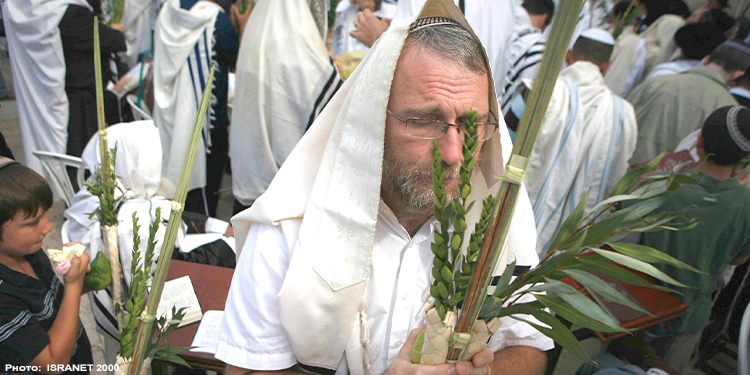Giving God Our Hearts
Yael Eckstein | October 5, 2023

On the first day you are to take branches from luxuriant trees—from palms, willows and other leafy trees—and rejoice before the LORD your God for seven days. — Leviticus 23:40
Throughout this week, my family and I will join Jews around the world in celebrating Sukkot, the Feast of Tabernacles. Please enjoy these devotions, which were prepared for you in advance, about this joyous holiday that immediately follows the High Holy Days.
Walk into any synagogue on one of the seven mornings of Sukkot and you will likely find the worshipers grasping a palm branch, some myrtle and willow branches, along with a citron. The leader of the service will chant some verses as the congregants shake the four species in six directions—up, down, backward, forward, right, and left.
To the uninitiated, the Jewish ritual of “shaking the lulav” may seem strange. This ancient tradition clearly has its roots in the Bible, but what is its meaning?
One explanation is that each of the species represents a different part of the body. The palm branch, known as the lulav, is long and thin. It represents a person’s spine, which is the source of our ability to move our limbs and get around in the world. The leaves of the myrtle resemble our eyes and symbolize our ability to see and discern things.
The leaves of the willow are shaped like the human mouth and represent our ability to speak, to sing, and to express ourselves. Finally, the citron looks like a human heart. This organ symbolizes out passions and emotions, which are the driving forces behind all we do.
Giving God Our Hearts
Taken together, the species represent the gifts that God has given us in order to accomplish and achieve, to create and do. But like everything in life, they can be used for good or bad. We can use what we are given to heal or to hurt. We can use our abilities in service of God or we can generate a life that is merely self-serving. God gives us the tools to make something of our lives, but we are the ones who determine what form our lives will take.
On Sukkot, we take the four species together in our hands as though we are holding all of our talents and God-given abilities. Then we make a blessing and dedicate them to God. Finally, we point in all directions to indicate that everything we will do with all that we have been given—any direction we walk in or choose—will be for the purpose of serving God.
“Shaking the lulav” is an act of great love. Appropriately, the word lulav can be broken down into the Hebrew words lo and lev, which means “to Him is my heart.” We began the journey of the High Holy Days by examining our relationship with God. We end it by giving Him our hearts and hands in an act of surrender and love.
Your Turn:
Use this time when Jews around the world celebrate Sukkot to ask yourself these two life-altering questions: “What God-given talents have I been given?” and “How will I use them in service of God?”
